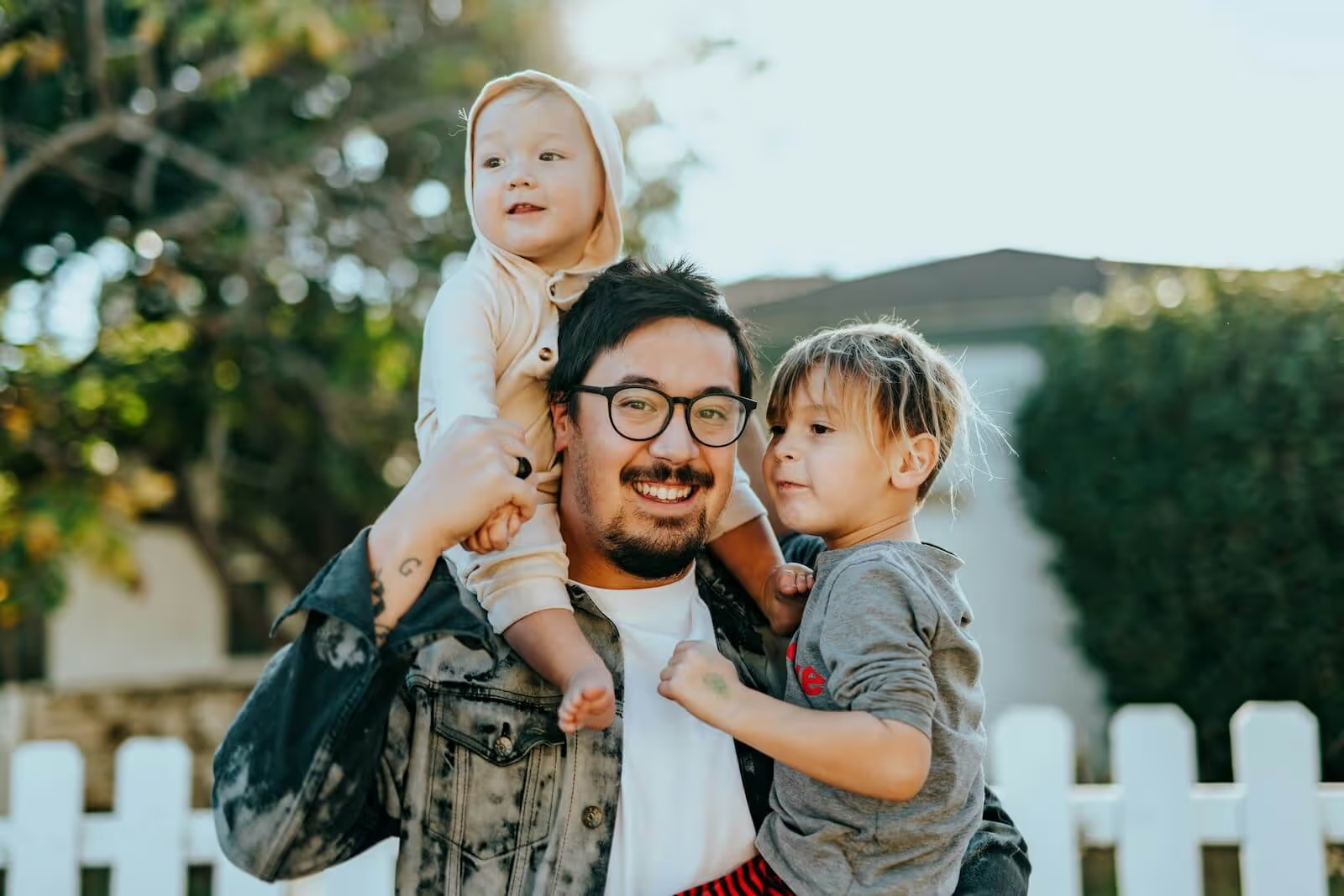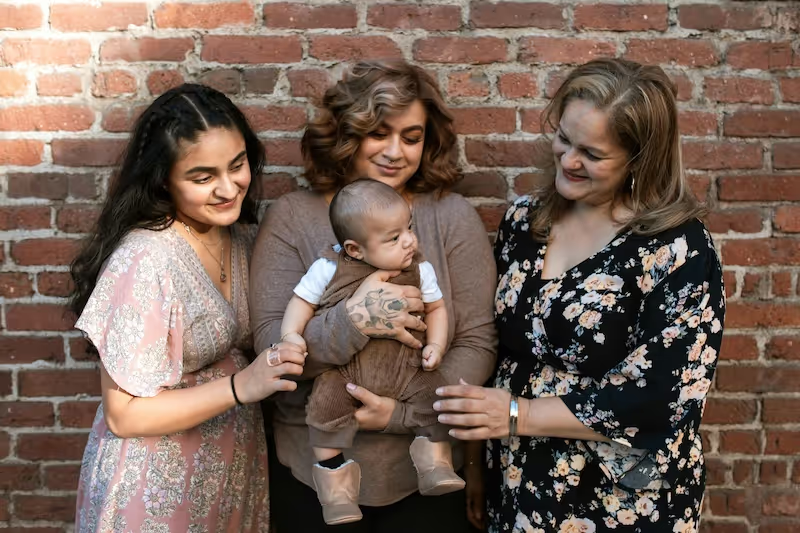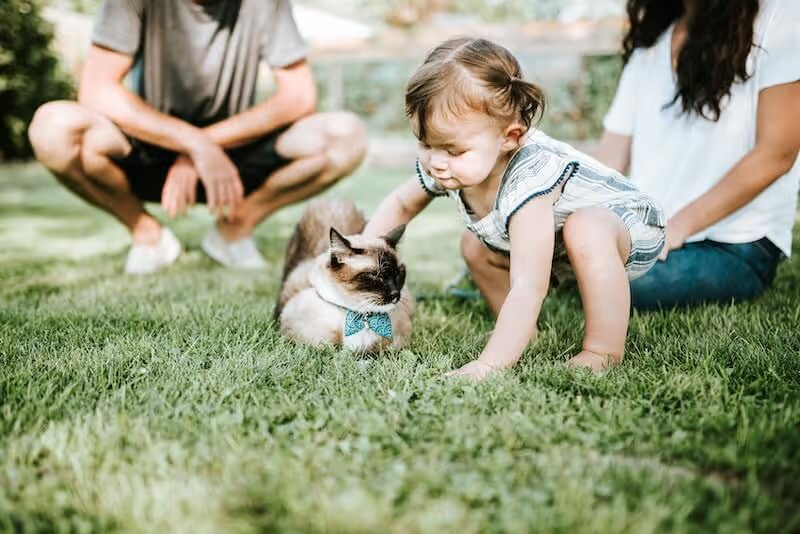We understand that discussing your estate plan (a will or a trust) may not be your favorite dinnertime discussion. However, regardless of your income or age, it’s essential to have a plan in place and share it with those you love. Here’s why it’s important for you to act now, and how to get started. It may not be as difficult or expensive as you think!
Not sure making a plan is for you? Síganos as we break down myths and share stories from the stories of Latino friends of FreeWill* community members as to why having a plan matters, today.
In a hurry? Skip to the end of this article for links to our most important estate-planning resources in both English and Español.
Before we get started, we want to clarify the language we use. We recognize that individuals may prefer gender-expansive terms like Latine/x or Hispanic, or may choose to self-identify by their country of origin, rejecting a monolith label altogether. We understand this complexity and support your right to self-identify. Our goal is simple: to ensure everyone has access to the information, resources and tools needed to plan for the future today.
For those outside the community, it’s important to remember that “Latino” is not the same as “Hispanic.” We use these terms distinctly to cite research. The clear differentiator is that “Latino” refers to geography, encompassing all countries in the Americas and the Caribbean, while “Hispanic” refers specifically to countries where the primary language is Spanish (excluding Brazil and Belize).
What is a Last Will & Testament?
A will is a legal document that explains who should receive your property (known as your estate) after you pass away.
With a will, you can:
- Choose who will inherit your property, money, and other assets after you pass away
- Think of your car, jewelry from your bisabuela, your bank account…it all counts as part of your estate. You have something to account for, le prometemos.
- Nominate a guardian for any minor children you have
- Choose a caretaker for your pets
- Name an executor to carry out the terms of your will
What is a Trust?
In estate planning, a trust is a legal arrangement you use to manage and distribute your property and assets after you pass away. It’s similar to a will, but with a key difference: assets in a trust can skip probate (the court-supervised process of distributing your assets after your death).
This can save your loved ones time, money and stress. This is especially true in states like California, where the probate process can be long and expensive.
There are two types of trusts: revocable and irrevocable. A revocable living trust (RLT) is one you can change or amend at any point during your lifetime. Irrevocable trusts usually require approval from a court or the trust’s beneficiaries before you can make changes. This increased rigidity offers protections that RLTs can’t, like tax benefits for larger estates and protection from certain creditors.
Who needs a will or trust?
The answer: Everyone! All adults over the age of 18 should have an estate plan — although the reality is far from ideal. Currently, 82% of Hispanic individuals and 67% of Americans overall don’t have a will.
Compared to other historically marginalized communities, a recent survey reports that Hispanic people are most likely to give the following reasons for not having an estate plan. Do any of these sound familiar?
Belief #1: I don’t have any wealth or assets, so I don’t need a will.
When asked, Latinos told us they and their family members don’t have wills because “they don’t have enough to hand down”:
“My mom has three houses here and a house in Mexico…it’s not a ton of money, but it’s money. My mom doesn't think she has any assets to account for. She doesn’t see it like that, and when I ask her what her plans are she tells me, “tu herencia va a ser que les dejaré una casa a cada quien.” It’s so frustrating — I just tell her to put it in writing and put her houses in a trust so there is a clear plan and we can benefit from it in the future to save us time and money dealing with it, but she hasn’t.”
La verdad: Everyone has something to protect. Home ownership and real estate aren’t the only assets we account for in our estate plans. Items like vehicles, family keepsakes, jewelry, and other valuables or sentimental possessions should be listed in your will to ensure they are passed on according to your wishes.
Also — despite what many people assume or hope — family members do not get to decide what happens to your property or who cares for your minor children if you die without a will. In reality, a local probate court makes these decisions based on arbitrary state laws that may not align with your wishes and will cost your loved ones time and money while they grieve the loss of you.
A friend of FreeWill shared a recent experience of managing the aftermath of his father’s death, who did not have a will in place. He had to handle assets in both the U.S. and Mexico:
“It’s really hard to be the one dealing with this — my family is all in Texas, so I am doing it completely alone. It’s really heavy, depressing and it takes days of time off work to go to Tijuana back and forth, sometimes the traffic is 4-5 hours in one direction just to get there. I’m pissed at my dad for not being the person to organize his stuff and leaving us to clean up afterwards. I have his car parked behind my house. I can’t even park my car at my place because I have to deal with his car first which might take years.”
Belief #2: Wills are only for the rich.
La verdad: Everyone 18 years and older should consider making a will or trust, regardless of income level.
A friend of FreeWill (35 years old) shared their own reflection on why they feel they should have a plan in place:
“I don’t have a will, I should probably get on that. Understanding your financial net worth and what you have, even if it’s pennies…you can leave it to someone or somewhere you love. You don’t want to leave it to the bank.”
Belief #3: Making a will or trust is too expensive.
Friends of FreeWill shared family stories like:
“Mijo, es que no tengo dinero para hacer esto.”
“There is a fear — like oh sh*t, it must be really expensive to do this. Pricing is a huge factor for them not doing it. Because my family members don’t know anyone that has done a will or what it costs and no one really talks about this in our circle that we are in. It’s scary and people assume it will cost more than what we have [to make a will].”
La verdad: You can create a will or revocable living trust for free on FreeWill’s platform in less than 20 minutes. You can also use FreeWill in conjunction with an estate planning attorney for more complex estate planning needs to save you time and money when you meet with your attorney.
Please note that FreeWill's will-maker is in English.
FreeWill creates wills and trusts that are valid for distributing property and assets located in all fifty states and Washington, D.C. Even if you live abroad, you can use FreeWill to decide how to distribute any assets you have in the U.S. However, for any property located outside the U.S., you’ll need a separate will that complies with the laws of the country or region where the property is.
If you and your loved ones have mixed immigration status, assets in multiple countries, or dual citizenship, it's a good idea to consult with an immigration attorney. They can help you navigate local laws, inheritance taxes, and logistical challenges (such as shipping items).
Other important reasons to have an estate plan in place
Reason #1: Grow generational wealth in your family and community.
Systemic barriers like redlining have prevented Latino communities from building generational wealth. Additionally, being classified as “White” in the Census until 1980 further impacted Latinos, influencing the allocation of federal funding and the drawing of district lines. To this day, we still lack an accurate count of Latino and other communities of color, leading to disparities in federal investments and redistricting in Latino neighborhoods.
Despite these obstacles, Latinos — one of the largest demographic groups in the U.S. — are projected to account for 70% of new U.S. homeowners in the next 16 years. This growth could boost generational wealth, highlighting the importance of having plans in place for managing your assets.
Reason #2: Protect your family business.
According to the U.S. Department of the Treasury, Latino business ownership and revenues in the U.S. are on the rise. Currently, there are approximately 5 million Latino-owned businesses generating more than $800 billion in annual revenue. From 2019 to 2023, the number of self-employed Latino workers in the U.S. increased by 26%.
It’s critical for Latino small business owners to include their businesses in their will or trust to ensure a smooth transition of ownership, succession, and wealth distribution. Having a plan safeguards all the hard work Latino business owners have poured into their businesses, preserving their legacy and the future prosperity of both their families and communities.
A friend of FreeWill shared her parents’ story: They grew up in Puebla, Mexico, and moved to the U.S. as teenagers, where they immediately began working full-time:
“When they came to America, they learned how to approach creating a business along the way. They did have some community support from family, but they just sort of jumped into business ownership.”
Although their family restaurant has been operating for 15 years, 2018 was the first time her parents considered creating an estate plan, at the suggestion of a tax lawyer who also handled estate planning. However, they decided not to proceed due to the lawyer’s high hourly fees and, to this day, have not completed their estate plan.
La familia es la fuerza: When deciding whether to create a will or trust, consider your most precious asset — your family — and how your legacy can help carry forward the traditions and values you cherish.
“It takes a village. In my family, every member had different things that they were the expert at. We all had different roles to help each other in adjusting to our lives in the U.S. Different members of the family sparked that initial care to save. My brother was the first person to help me set up a savings account.”
“My parents are very open to talking more about estate planning. The idea of estate planning within my family at large is a lot about taking care of the family."
“I think a lot about doing a will myself to be a role model to my family. All I have is my car and what I have invested in my house and who I want to take care of my kid. My hope is that after I make my plan, and it's all said and done that I can say to them - now you can do it too. And I can help you."
“I would like to share with my family and teach other folks that estate planning is a way to keep your legacy alive, to protect your family, your communities, your future.”

How can FreeWill help you normalize the charla about planning for the future with those you love?
“We all work really hard for what we have. If financial planning were talked about earlier, it would have helped us all greatly in life.”
“We are so afraid of talking about money, even when you talk about the benefits of having a will or trust. I have never heard my siblings say a word about planning and each of them has children and none of them have a will in place.”
“It’s been really taboo to talk about these things — my grandfather didn’t create his plans until the day he was diagnosed with Alzheimer’s…you just don’t talk about it widely. Even though younger folks are more open-minded to having these conversations, historically they didn’t grow up privy to these conversations.”
“There is a lack of education in my community which is lower income. No one knew or cares about this when you have to do what you have to do with 2 or 3 jobs, you can’t think of this. There is no space for it.”
We want to acknowledge that language barriers can prevent people from making their wills or discussing these plans with members of the family depending on the primary language in your family.
“It’s a question of financial literacy. If you have financial literacy, you will see estate planning as something necessary. It is the foundational education piece. If there were digestible resources in Spanish it would help.”
“Videos would help for older generations who can’t read and write.”
Begin where you are: Resources for Latino individuals & families
FreeWill provides important resources to help start these planning conversations today. Check out our Multilingual Resources hub for important articles in both English and Español:
- 10 most important reasons to make your will | Las 10 razones más importantes para tener un testamento
- End-of-life planning checklist | Lista de comprobación para la planificación del final de la vida
- How to complete your will in 10 steps | Cómo hacer un testamento en 10 pasos
Other important ways to plan for the future and resources to get the conversations started:
- What is an advance healthcare directive (AHCD)? | ¿Qué es una directiva anticipada de atención médica (AHCD)?
- What is a financial power of attorney? | ¿Qué es un poder financiero?
Please note that FreeWill's will-maker is in English.
*”Friends of FreeWill” stories were generously shared in interviews by seven individuals. Some are team members and some have no affiliation with FreeWill. Some came to the U.S. from several different countries of origin at different ages and some were born in the U.S. All identify as part of the Latino community.
Make your free estate plan today

Make your free advance healthcare directive

Make your free durable power of attorney

Make a stock donation today

Make your free revocable living trust










